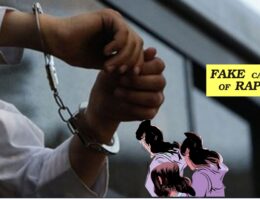Table of content
- Meaning of the Third Gender.
- Landmark Judgement.
- Legal recognition (Judgement).
- Rights of Transgender Persons.
- Directions to State and Central Government.
- Rights of Transgender Persons Boll, 2014.
What is the meaning of the Third gender?
In India, the Supreme Court in April 2014 recognized hijras, transgender people, eunuchs, and intersex people as a ‘third gender‘ in law.
Meaning: A category of people who do not identify as male or female, but rather as neither, both, or a combination of male and female genders.
The third gender is a concept t in which individuals are categorized, either by themselves or by society, as neither man nor woman
The state of personally identifying as, or being identified by society as, a man, a woman, or other, is usually also defined by the individual’s gender identity and gender role in the particular culture in which they live.
Landmark judgment
National Legal Services Authority v. Union of India
This judgment has been distinguished as a major step toward gender equality in India. Moreover, the court also held that because transgender people were treated as socially and economically backward classes, they will be granted reservations in admissions to educational institutions and jobs.
Petitioner-
- National legal service authority of India (Primary Petitioner).
- Nasib Kaur Ji women welfare society & NGO.
- Laxmi Narayan Tripathi (a renowned Hijra)
Judgment was given by Justice K.S.Panicker Radhakrishanan and Justice Arjan Kumar Sikri.
Legal recognition (Judgement)-
Supreme Court declared Transgender people as the third gender.
- Confirmed the Fundamental rights of transgender people under the Constitution of India.
- The right of gender identification was also given as male, female or third gender.
- Central and State government has been directed to provide medical care to the Third Gender & provide them with separate public toilets and other facilities.
- Centre and State Governments have been asked to extend reservations in educational institutions and for public appointments.
- Center and State Governments were asked to take steps to create public awareness.
Rights of transgender persons
The preamble to the constitution mandates every citizen Justice: social, economic, and political equality of status.
The Indian state policy that earlier recognized only two sex i.e. only male and female has deprived the third gender of their several rights as an Indian citizen, which includes the right to vote, the right to own property, the right to marry, the right to claim a formal identity through a passport, etc. and more importantly their the right to education, employment, health so on. Basic rights which they were deprived of their fundamental rights under Article 14, 15, 16, and 21.
Article 14, 15, and 16 provide the right to equality, and Article 21 provides the right to freedom for every Indian citizen but transgender persons were deprived of their basic right to freedom and equality.
Directions to the central and state government
The court issued certain directions to the central and state government which are:
- Hijras, eunuchs should be treated as the third gender for the purpose of safeguarding their fundamental rights,
- Recognize the person’s need to identify his own gender.
- Providing reservations in public education and employment as socially and educationally backward class of citizens,
- Making special provisions regarding HIV surveillance for transgender persons and providing appropriate health facilities,
- Tackle their problems such as fear, gender dysphoria, shame, depression, suicidal tendencies, etc.
- Measures should be taken to provide health care to transgender people in hospitals such as making separate wards and also providing them separate public toilets,
- Frame social welfare schemes for their all-round development,
- To create public awareness so that trans genders feel that they are part of society and are not to be treated as untouchables.
The Rights of Transgender Persons Bill, 2014
The Rights of Transgender Persons Bill, 2014 is a proposed Act of the Parliament of India which seeks to end the discrimination faced by Transgender people of India. The Bill was passed by the upper house of Rajya Sabha on 24 April 2015. It was introduced in the lower house of Lok Sabha on 26 February 2016.
Rights and entitlements under the bill were mostly substantive such as Equality and non-discrimination, Transgender children, the Right to life and personal liberty, the Right to live in the community, the Right to integrity, Protection from torture or cruel, inhuman, or degrading treatment or punishment, Protection from abuse, violence, and exploitation, Right to home and family, Freedom of speech, etc.
Education, Skill development and employment, social security, social security, health, rehabilitation, and recreation are also covered under the Bill. The chapter on education makes it mandatory for the Government to provide inclusive education for transgender students and provide adult education to them.
The Bill contemplates setting up several authorities and forums – National and State Commissions for Transgender Persons. The Commissions work will be mostly to-
- Identify, suo-moto, or on a representation received, provisions of any laws, policies, or programs procedures, which are inconsistent with this Act, and recommend necessary corrective steps
- Review and Co-ordinate the activities of all Departments of Government and other Governmental and non-Governmental Organizations which are dealing with matters concerning transgender persons.
- Inquire, suo-moto or on a complaint by an affected transgender person or any person or organization on his behalf, with respect to the deprivation of his rights and safeguards in respect of matters for which the Central Government is the appropriate Government and take the up the matter with the appropriate authorities for corrective action, as necessary
- Intervene in any proceeding involving any allegation of violation of the rights of transgender persons pending before a court with the approval of such court
- Review the safeguards provided by or under this Act or any law for the time being in force for the protection of rights of transgender persons and review the factors that inhibit the enjoyment of rights of transgender persons and recommend appropriate remedial measures.
- Study treaties and other international instruments on the rights of transgender persons and make recommendations for their effective implementation.
- Undertake and promote research in the field of the rights of transgender persons.
- Promote awareness of the rights of transgender persons and promote awareness of the safeguards available for their protection.
- Monitor implementation of the provisions of this Act and of schemes, and programs, meant for transgender persons.
- Monitor utilization of funds disbursed by the Central Government for the benefit of transgender persons.
- Such other functions as the Central Government may assign.




Simply desire to say your article is as amazing. The clarity in your post is just nice and i can assume you are an expert on this subject.
Well with your permission allow me to grab your feed to keep
updated with forthcoming post. Thanks a million and please
keep up the gratifying work.